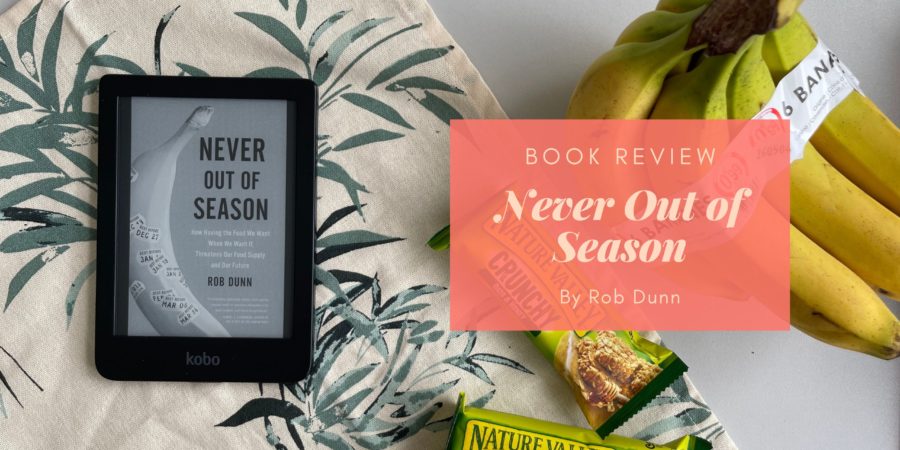I’ve had this book on my Overdrive wishlist for a while, but I didn’t really think about reading it until I had to prepare a talk about tea and remembered that a few farms have talked to me about the dangers of monocultural crops, and suddenly, Never Out of Season seemed really relevant.
Never Out of Season is about how the loss of biodiversity in our food crops could lead to food security issues. To try and summarise the whole book into a few sentences: in our quest for food stability, we have dedicated ourselves to cultivating high yield species. However, an overdependence on one species of crop (e.g. one type of wheat, one type of tea, one type of chocolate) means that farms are susceptible to diseases. In order to save ourselves from possible starvation, we need to preserve the genetic variety of plants, but sadly, that work is undervalued and many seeds are at risk due to war and/or governments who don’t care.
Dunn talks about several frightening cases in the book – such as the potato famine that killed millions in Ireland, the act of bioterrorism that killed cacao trees in Brazil, and a mealybug that feeds on cassava, the main food source for many people in sub-Saharan Africa. All of these are tragic stories, but I think one of the most tragic ones is the story of Vavilov and his vault of seeds. Vavilov was captured during WWII for opposing Stalin and his vault was caught up in the Siege of Leningrad. His assistants literally died of starvation while keeping these plants alive but after all that effort, the land that the station was located on was sold to a private developer in 2010. This was a pretty big problem because many varieties of seeds are planted on the site. The site was even pronounced useless by the government in 2011! Then in 2012, there was a federal order that allowed the station to remain but it does not come with funds, which means that after all the sacrifices made to save these seeds, the thing that kills the vault is a lack of money.
It is pretty frightening to learn how close we are to a sudden shock to our food supply and it’s befuddling why this is not getting much funding; there’s a very sad illustration of how the weekly budget for the war in Iraq from 2003 to 2010 (way over 2 billion) to the 2006 budget for ICARDA, which works to ensure the future of agriculture in Iraq, the Middle East, and North Africa (much less than 0.5 billion).
Overall, this was an eye-opening book that was a little scary and which made me think quite a bit. For example, Singapore is highly dependent on importing food, so any of these blights would obviously affect us. But what can we do and how can we help? I checked Dunn’s website and there is a Get Involved page – I’m unfortunately not in the position to make sourdough, because I don’t have an oven, but if you are the baking type, this may be something you’re interested in! I was also prompted by this book to see if Singapore is doing anything, and I found out we have something called Biodiversity of Singapore (BOS). If you’re interested in the book, you may also want to see if your local area is doing anything about this issue.
Finally, if you’re curious about tea farms that are concerned about the issue of monoculture crops, check out these sustainabiliTEA posts:
- Jun Chiyabari (Nepal)
- Satemwa Tea Estate (Malawi)
- NPO Agriculture Support Team in Saitama (Japan)

Yes this is such an important step in reducing food insecurity! I didn’t know there was a book about it so yet another one on my radar now because of you hahaha
I hope you enjoy this one!! I didn’t know much about the subject so I really enjoyed it.